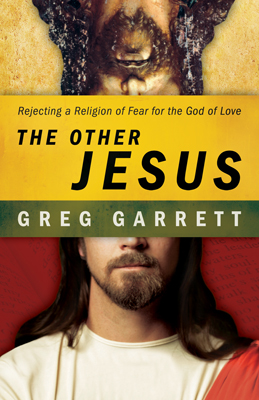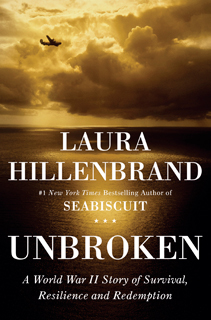If, like me, you’ve been following the brouhaha over Rob Bell’s alleged universalism in the last week — and if, like me, you wonder why it is such a big deal that a pastor might choose to emphasize a theology of love than a doctrine of hell — then I have a book for you.
Greg Garrett’s The Other Jesus: Rejecting a Religion of Fear for the God of Love is a wise, compassionate exploration of a wise, compassionate God. It’s for anyone who was ever burned by the institutional church but retains a shred of hope that there’s something astonishing about this Jesus figure. –JKR
What do you mean by the “other” Jesus?
I have a dear friend, Scott Cairns, who grew up unhappily Baptist and then, as he writes in Short Trip to the Edge, tried “to sort through some of the untenable baggage of my beliefs without abandoning the faith altogether.” Like me, Scott’s experience of God the Father and God the Son in the churches of our youth felt wrong, and he wrote his poem “The Spiteful Jesus” about that. I refuse to make the Spiteful Jesus my model for whom God is and what I am supposed to be. But I can and have chosen to follow the Other Jesus, who modeled love, self-denial, sacrifice, and inclusion, and to revere the God of Resurrection who brings new life and transformation instead of guilt and condemnation.
Who is the primary audience for this book?
I hope folks who were raised in a faith tradition that alienated them from God might read the book and realize that other ways of loving and serving God might be life-giving for them. I also want to chime in on the emerging Christian conversation about belief and practice, and to remind those in Mainline and Catholic traditions of the riches of engaging the Christian life as pilgrimage and discipleship instead of simply a set of beliefs.
You’ve been blogging about the “other Jesus” at the Christian Century for a while, and about politics for Patheos, and now also at The Thoughtful Christian. What do you enjoy most about blogging?
I like the immediate feedback–there’s a rush that comes with it, whether the comments are approving or disapproving. Blogging is like preaching, another medium I like because of the immediate feedback.
In both, I want to do a thoughtful exploration of something important that ends with some kind of real life call to action.
What are your personal pet peeves about American Christianity today?
I am most peeved by Christians who exclude, condemn, or otherwise reject other Children of God. My family and I had direct experience of this in my youth when my parents became the first in our congregation to divorce. In the years since, I’ve watched as other Christian bodies have marginalized women, or people of another faith, or gays, all in the name of some reading of the Bible they consider sacrosanct.
The Other Jesus is about reclaiming a Christianity that is less about judgment than love, and less about believing one has all the answers than faithful journeying toward God. In the dark days when I suffered from chronic serious depression, The Spiteful Jesus could not have saved my life; in fact, my therapist would have said that he helped put me into the pit. But the Other Jesus told me that whatever wrongs I had done, whatever ways I had fallen short in my own mind or the minds of others, I was beloved. The Other Jesus convinced me that there was a plan for me, an invitation to help him build the Kingdom of God, and if I would take a step in faith, he would walk with me all the rest of the way.
I was ultimately able to return to faith because of embodied love and radical hospitality, which rescued me and convinced me that there was a way to be a Christian I had never known before. In writing about that way, I’ve had to be lovingly critical of some of the beliefs and practices I’ve witnessed that were soul-killing for me. If you disagree with what I write in The Other Jesus, I don’t imagine you’re going to Hell, whatever that might be. But please don’t insist that other people who love God might be, or treat them in this life with anything less than the love and compassion that Jesus himself modeled.

You’ve had a far-ranging writing career. You’ve done fiction, at least one memoir, and several non-fiction books about pop culture, including books about U2, movies, Harry Potter, and superheroes. How do you choose your projects?
I choose nonfiction projects these days based on what I’m passionately interested in that someone else seems to be passionately interested in. I write about religion and culture since artifacts of literature and culture were my spiritual guideposts during my long trip through the wilderness, and continue to draw me closer to God today. I wrote about depression after a publisher felt my experience might help others struggling in the mire, or those who loved them. I wrote about grief after finishing that memoir and spending a summer in seminary as a hospital chaplain. Projects often open doors to other projects.
The Other Jesus grew out of conversations that my earlier books had prompted with people in and out of the faith about discipleship in the 21st Century. Formal interviews and friendship with many in the Church, and my own past experience and seminary education at the Seminary of the Southwest gave me a lot of data, a lot of opinions, and, it seemed, some wisdom about how life-giving faith might work. As a non-ordained public religious intellectual, I have an interesting insider-outsider status that gives me a valuable perspective. All of this led me to the point where I thought that I might write something that gathered together what I’d realized to this point in my journey about what was and was not life-giving for me as a follower of Christ. I was encouraged by my friends at Westminster John Knox who, unlike many publishers, were willing to try something a little different, and so I wrote The Other Jesus.
What’s next for you, writing-wise?
I’m writing online every week. I’ve just finished a novel, which is circulating in New York as we speak. This summer in Wales, I’ll finish my book on 9/11, religion and culture, slated for 2012 publication. And Baylor has given me a research leave for 2012 where I’ll be working in the UK on projects on religion and politics and on Christian spirituality.


